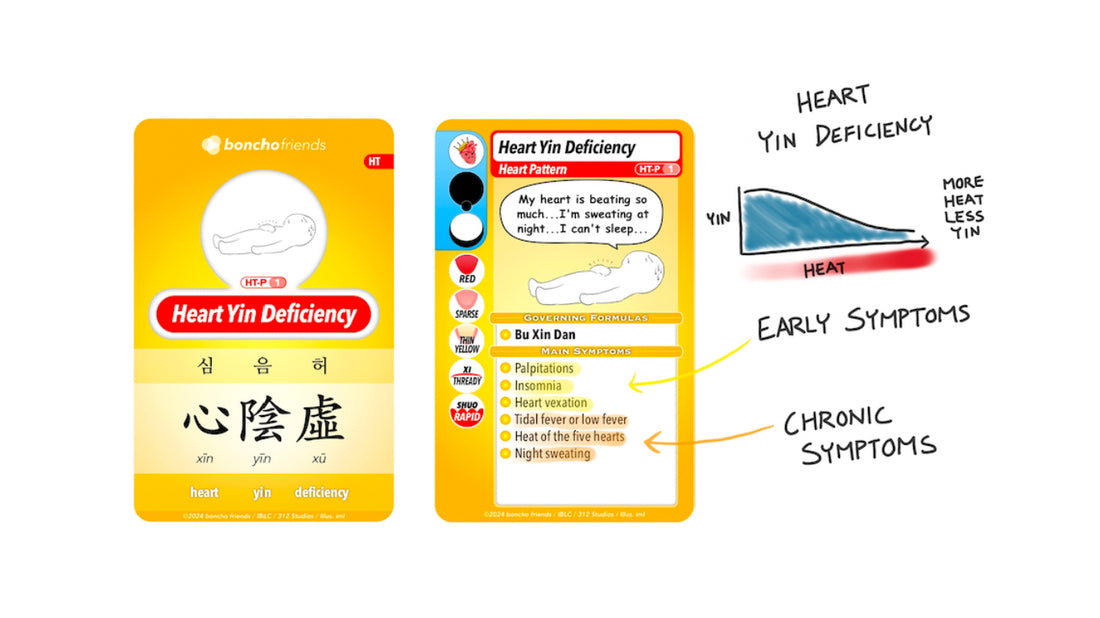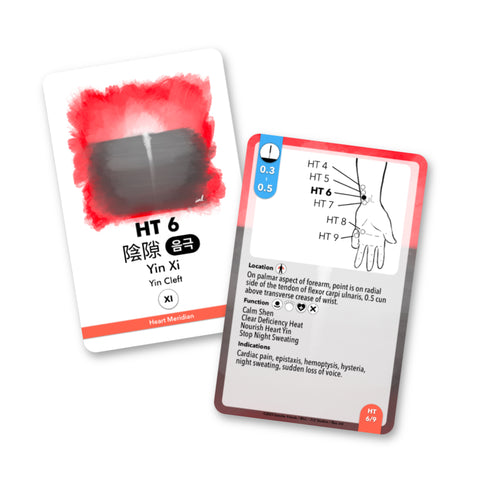
Heart Yin Deficiency (心陰虛)
Share

In traditional Chinese medicine (TCM), the concept of Heart Yin Deficiency represents a fundamental imbalance that can manifest in various health issues. Let's delve into the intricacies of Heart Yin Deficiency, exploring its symptoms, diagnostic indicators, and its broader implications in TCM practice.
Exploring Heart Yin Deficiency
Heart Yin Deficiency, known as "xīn yīn xū", reflects an imbalance within the heart's Yin energy, the aspect associated with nourishment, calmness, and balance. When the Yin aspect of the heart is deficient, it disrupts its harmonious function, leading to a cascade of symptoms and potential health complications.
Recognizing Symptoms
The manifestations of Heart Yin Deficiency encompass a spectrum of physical and emotional symptoms:
- Palpitations: Irregular or forceful heartbeats.
- Insomnia: Difficulty falling or staying asleep.
- Heart vexation: Restlessness or unease in the chest.
- Tidal fever or low fever: Episodes of heat sensations or low-grade fever.
- Heat of the five hearts: Heat sensations in the palms, soles, and chest.
- Night sweating: Excessive sweating during sleep.
Diagnostic Indicators
In TCM diagnosis, Heart Yin Deficiency is discerned through a combination of clinical observations and assessment of traditional diagnostic parameters:
- Tongue: The tongue may appear red, with a sparse coating and thin yellow fur.
- Pulse: The pulse is typically thready and rapid, reflecting the underlying deficiency in the heart's Yin energy.

The Usual Suspects: Causes of Heart Yin Deficiency
- Stress: The modern-day epidemic of stress takes a toll on the heart's Yin energy, leading to depletion and imbalance.
- Yang Evils: External factors such as summer heat, dryness, and fire can disrupt the body's Yin fluids, exacerbating the deficiency.
- Foods: Certain dietary choices, including spicy and fatty foods, contribute to internal heat accumulation and dampness, further depleting Yin fluids.
Understanding the Mechanisms
When stress levels soar, the heart responds by working harder, leading to increased heart rate and circulation. This heightened activity depletes Yin fluids, exacerbating the deficiency. Similarly, exposure to Yang evils and consumption of heat-inducing foods contribute to internal heat accumulation, disrupting the delicate balance of Yin and Yang energies within the body.
The Ripple Effect: Consequences of Heart Yin Deficiency
As Yin fluids diminish, the heart's ability to function optimally is compromised. The organ may become overworked and overheated, leading to a cascade of symptoms associated with Heart Yin Deficiency. Palpitations, insomnia, and night sweating are just a few manifestations of this imbalance, reflecting the body's attempt to cope with internal disharmony.
The Path to Healing: Restoring Balance
Addressing Heart Yin Deficiency requires a multifaceted approach that encompasses lifestyle modifications, dietary changes, and therapeutic interventions rooted in TCM principles. By reducing stress levels, avoiding heat-inducing foods, and embracing cooling herbs and tonics, individuals can support the restoration of Yin fluids and promote harmony within the body.
Acupuncture Treatment Points for Heart Yin Deficiency

- Acupuncture Point Card from Acupuncture Set -
HT 6 (yīn xī): Used for night sweats, steaming bone disorders, and tonifying Yin and Blood.
- Calm Shen
- Clear Deficiency Heat
- Nourish Heart Yin
- Stop Night Sweating

- Acupuncture Point Card from Acupuncture Set -
HT 7 (shén mén): Used to tonify deficiencies of the HT Qi, Blood, Yin, and Yang.
- Calm Shen
- Regulate Heart
- Blood and Qi

- Acupuncture Point Card from Acupuncture Set -
UB 14 (jué yīn shū): For all heart conditions, palpitations, anxiety, and stress.
- Regulate Heart and Liver Qi
- Unblock Chest

- Acupuncture Point Card from Acupuncture Set -
UB 15 (xīn shū): Main point for all heart-related issues from a TCM perspective.
- Calm Shen
- Clear Heart Heat
- Nourish Heart
- Regulate Heart Qi
- Unblock Chest and Blood Stagnation

- Acupuncture Point Card from Acupuncture Set -
SP 6 (sān yīn jiāo): Main point for Yin deficiency-related issues
*Avoid needling during pregnancy
- Calm Shen
- Cool Blood
- Dispel Damp
- Harmonize Liver
- Nourish Blood and Yin
- Promote Urination
- Regulate Menstruation
- Tonify Spleen, Stomach, and Kidneys
Understanding the Heart Yin Deficiency pattern guides us towards accurate diagnoses and targeted therapeutic approaches.
Our team has been working on the Foundations Deck, consisting of the most important essences of TCM foundations you must know in order to pass the board exam and to help you with your practice!
Our Foundations Deck comprises study cards for the most crucial Zang-Fu organ patterns, essential for grasping the complex concepts of Traditional Chinese Medicine foundations. With intuitively designed icons, images, and visuals complementing the text, the Foundations Deck serves as an effective tool for memorization 🧠⚡️
Associating these vivid visuals with TCM concepts reinforces memory and improves recall. With the Foundations Deck, mastering TCM concepts becomes not only accessible but also enjoyable!
It’s simple, fun, and easy🙌!
Click the image below and learn more about our Foundations Deck!

